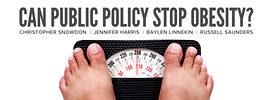What causes people to be obese? While I agree with much of what Christopher Snowdon wrote in his lead essay and response piece, it’s noteworthy that he repeats the popular cliché that all calories are created equal—also known as the “calories in/calories out” theory of obesity. In his lead essay, Snowdon writes that “obesity is the result of consuming more calories than an individual burns off.”
That theory may very well prove true. But it also may not.
On this issue, I am inclined to agree more closely with the opinions of fellow essayist Russell Saunders, who suggests that the problem may be more complex than the calories-in-calories out formula suggests.
Interestingly, many progressives and libertarians alike argue that this theory is false. The so-called “paleo” movement, which counts many libertarian adherents, posits that a carbohydrate-rich diet is the leading cause of obesity. Libertarian paleo practitioners don’t tie their belief in the inherent evil of carbohydrates—a family that includes sugar, and, hence, soda—to any call for increased regulations to limit their consumption. But progressives like Dr. Robert Lustig are particularly opposed to sugar consumption—labeling it a “poison”—and they use that hostility as a jumping-off point to call for a host of severe regulations to curtail sugar consumption.
While I find myself more inclined to agree with Saunders in questioning the calories-in/calories-out theory as overly simplistic, I disagree with the crux of his reasoning on any potentially positive impact soda taxes might have on consumers. Saunders attempts to debunk Snowdon’s argument that higher soda taxes will drive consumers to purchase other caloric beverages or to make them at home. Saunders engages in a bit of hair splitting to make his point, arguing, for example, that people are unlikely to make high-calorie milkshakes at home because doing so is too time-consuming. He describes “the significant effort necessary to whip up a milkshake, to say nothing of having the ingredients and equipment on hand.” I would love to introduce Saunders, a physician who “specializ[es] in medically complex patients”—now that sounds truly difficult—to the $25 Cuisinart hand blender I use to make protein shakes every day, in 20 seconds or less.
Even if homemade milkshakes won’t bring all the boys to the yard as readily as soda might, that point doesn’t do a whole lot to negate Snowdon’s solid point that soda taxes will encourage people to switch from soda to other caloric beverages.
Saunders is also critical of Snowdon’s argument that soda taxes will encourage people to switch from soda to beer. Interestingly, Saunders bases his argument on nothing more than his own personal observations and experience, saying that he can drink as much Mountain Dew as he’d like at work but would run into problems if he tried to turn his office into a scene out of Mad Men or Boardwalk Empire, in which alcohol is the workplace’s constant lubricant. Sure, that’s true. But while research may not show that soda taxes increase alcohol consumption at work, it does show that that soda taxes increase overall alcohol consumption. One study, for example, found that a ten percent tax (similar to tax passed by Berkeley voters) “led to increased purchases of beer.” Given that alcohol is nipping at the heels of soda already in terms of overall consumption rates, there’s reason to believe that soda taxes in a large state or a few large cities might help tip the scales in alcohol’s favor.
In making his arguments about milkshakes and beer, Saunders also ignores Snowdon’s claims that consumers might switch from soda to juice. As I’ve noted before, soda contains the same number of calories, more or less, as a glass of orange juice. But if milkshakes, beer, and juice aren’t the answer for the consumer, then soda taxes may succeed in pushing consumers to switch from soda to… soda. Already, in fact, many well-heeled consumers use gadgets like Sodastream to craft their own soda at home.
In short, it’s impossible to discount the fact that soda taxes will simply push consumers to replace calories consumed in the form of store-bought soda with any number of other caloric offerings. There is no shortage of high-calorie alternatives to soda available today.
So just what is it that makes soda a policy concern? Jennifer Harris’s policy arguments hinge on her claims about the uniquely pervasive impact of sugary drinks like soda on the health of America’s youth. The data she refers to are indeed shocking. “Sugary drinks (including sodas, fruit-flavored drinks, sports drinks, energy drinks and flavored waters) are the single largest source of calories and sugar in children’s diets,” writes Harris.
But that’s simply not true. While Harris doesn’t refer to any source to support her claim, widely cited U.S. government data paint a different picture. In fact, the main source of calories in children’s diets is “grain-based desserts.” The second-largest source is pizza. Sodas and other sweetened beverages are third on the list. (For adults, soda falls fourth on the list.) By no measure are these drinks “the single largest source of calories” consumed by children.
I’ve seen this claim before. For supporters of soda taxes, I suspect making such bold claims—that soda contributes more calories than any other source, particularly as part of children’s diets—are necessary to bolster arguments in favor of taxes. For example, in 2012, I refuted claims by the Center for Science in the Public Interest that “[s]ugary drinks are the single-largest source of calories in the American diet.” The same government data I cited above prove that claim to be false.
Arguments in favor of soda taxes require that soda be the bogeyman. But what’s hiding under the bed are some key facts that show otherwise. If the purpose of soda taxes is to make people any healthier, these taxes will fail. Notably, if the purpose of soda taxes is to compel people to drink less soda and to punish soda companies and consumers without creating any measurable health benefits, then soda taxes are the answer.

